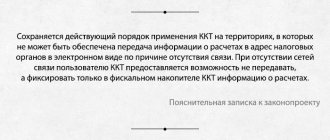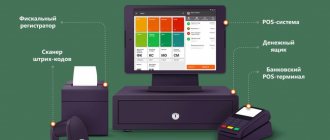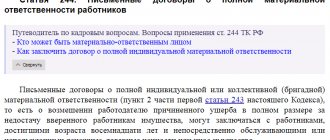All employees of the organization who directly work with cash are responsible for strict compliance with the strict norms of cash discipline established by federal legislation and internal regulations of the business entity.
This means that even when hiring, they must be familiar with the relevant instructions, regulations and orders of the enterprise, as well as with the Directives of the Central Bank of the Russian Federation, the requirements of the laws of the Russian Federation and other regulatory documents.
If the management of the employing company neglects the proper implementation of this stage, and the signature on familiarization is put by the responsible employee purely nominally, violations of cash discipline cannot be ruled out in the future.
Failure to comply with these rules by an economic entity entails liability provided for by current legislation.
How is the fine paid?
In the chart of accounts there is a subaccount number 64, it is called “Calculation of taxes and payments”. It includes several subaccounts. It is through one or more of them that it will subsequently be necessary to carry out operations to pay the fine.
What issues can be regulated by regulatory documents on cash discipline? Cash discipline is a very abstract concept, since it is not included in legislative documents and is not indicated. There is a list of working issues that can be regulated using documents:
- Correctness of the cash transaction;
- Correct execution of cash transactions;
- Carrying out cash payments in foreign or national currency.
Inspections by tax authorities are carried out during visits or scheduled inspections of the organization, which are carried out during reporting periods. What points require compliance with cash discipline? What can inspectors check? It will be necessary to provide them with a cash book for verification, as well as other documents accounting for the organization’s funds; the cash register can be checked. The amount of cash in the cash register is reconciled with the amount indicated in the cash book.
What is the basis for knowing the procedure for preparing cash documents?
The changes made to Law No. 54-FZ by Law No. 290-FZ not only affected the requirements for the cash register equipment used, but also led to updated requirements for the documents generated by this equipment: cash receipts and BSO. At the same time, the BSO has become a document in the execution of which devices similar to online cash registers must be used. Accordingly, the list of details for documents generated by the new cash desks turned out to be the same (Article 4.7 of Law No. 54-FZ).
Read about what has changed for BSO with the advent of online cash registers in the article “Law on online cash registers - how to apply BSO (nuances)” .
There are 2 types of actions recorded at the operating cash desk:
- Receipts using a cash receipt order (PKO) form KO-1, to which, if possible, documents are attached confirming the amount of the incoming amount. The detachable part of the PKO (receipt), containing the signatures of authorized persons and a seal, is transferred to the depositor.
- Expenses using the cash expense order (RKO) form KO-2, to which, as a rule, documents are attached confirming the amount of the amount issued (pay slips, memos, copies of orders, checks, receipts). The RKO reflects the details of the recipient’s identity document. If receipt is carried out by power of attorney, then its original (if the power of attorney is one-time) or a copy (if the power of attorney is not one-time) is attached to the RKO.
The PKO and RKO forms are established by Decree of the State Statistics Committee of the Russian Federation dated August 18, 1998 No. 88 and are mandatory for use in the Russian Federation when registering income and expense transactions. Each operation requires its own separate document.
All PKOs and RKOs issued during the day are recorded in the cash book of the KO-4 form, which sums up the work for the day (receipt and expense turnover) and displays the balance at the end of the day.
PKO, RKO and cash book contain a reference to accounting accounts, the indication of which is mandatory for companies and optional for individual entrepreneurs who do not have to keep accounting (subclause 1, clause 2 of the law of December 6, 2011 No. 402-FZ).
Additionally, such forms of cash documents can also be filled out as a journal for registering incoming and outgoing cash documents of form KO-3 and a book of accounting for funds accepted and issued to other cashiers of form KO-5.
The procedure for filling out cash documents is given in Resolution of the State Statistics Committee No. 88 and instructions of the Bank of the Russian Federation No. 3210-U.
Read about the rules for filling out cash orders in the following materials:
- “How is a cash receipt order (PKO) filled out?”;
- “How is an expense cash order (RKO) filled out?”.
Types of violations
There is a list of violations that occur most often in the enterprise. Their identification will certainly entail that you will have to pay a fine provided for violation of cash discipline in 2021. Let's consider typical deviations from the rules of discipline:
- There is an amount in the cash register that is not indicated in any documents, that is, it does not have documentary evidence of its origin.
- The amount of cash in the cash register exceeded the amount established by documents.
- Violations related to the storage of funds.
- Cash payments are carried out beyond the limit. The limit on transactions is set individually for private entrepreneurs, legal entities, and so on.
Violation of cash discipline implies failure to comply with or ignore regulations that can be determined at the legislative level or established by the organization itself.
What you need to know about working with CCP
The requirements for the CCP used in 2020–2021 are determined by the updated law No. 54-FZ.
From 02/01/2017, only new-style cash registers (online cash registers) began to be registered with the Federal Tax Service. From July 1, 2019, this type of cash register became mandatory for use by almost all business entities.
Online cash registers are fundamentally different from previously used cash registers with a fiscal drive. Accordingly, the requirements for them are completely different.
For general requirements that online cash registers must meet, read the article “Where and at what price can you buy an online cash register?” .
The problems that arise during their work also became different.
You will find answers to many questions related to the use of online cash registers in our section “Online cash registers KKT KKM”.
Failure to comply with cash discipline
All cash transactions must be carried out strictly in compliance with the laws on this issue. If there are violations in the conduct of cash transactions, then fines are provided for this. For 2021, fines for violations during cash transactions are expected to remain unchanged compared to 2015. If violations are discovered after a tax audit,
both the official and the enterprise will pay
a fine The only difference is the amount that will need to be paid, and they have approximately the following indicators for 2019:
- The official through whose fault the error occurred will have to pay a fine in the amount of four to five thousand rubles.
- The company will have to pay an amount approximately ten times larger - from 49 to 50 thousand rubles.
An official is the chief accountant of an enterprise or a person who carries out cash transactions. Before starting to perform his official duties, the cashier will have to sign an agreement that implies financial liability in the event of a violation of cash discipline. Based on the results of the audit in 2021, the fact of strict non-compliance by this person with the rules for conducting cash transactions may be revealed, then only he himself may bear financial responsibility. This is possible if you prove the fact of non-compliance, which resulted in large material losses for the enterprise.
conclusions
It is easier for business entities to comply with the basic requirements of cash discipline than to allow violations of the rules for conducting cash transactions.
Failure to comply with the procedure for maintaining an operating cash register and the rules for using online cash registers entails the imposition of monetary fines.
In addition, violators of cash regulations are more often subject to audits initiated by the tax service.
Penalties are differentiated depending on the organizational form of the business entity.
Some rules for maintaining documentation
There are certain rules for maintaining cash documentation, compliance with which is mandatory for 2015 and 2021. So, for cash documents it is not allowed to make any corrections, notes, amendments, and so on. At the stage of initial accounting of funds, special forms are used. They can be filled in by hand, but only a specific color of ink can be used. If the form is damaged, it is crossed out with two lines parallel to each other.
2019 – the rules for conducting cash transactions will be changed. Let's look at the main ones.
- It will be possible to conduct reporting in electronic form, but it must require an electronic signature.
- All documents can be certified not only by the cashier, but also by the head of the enterprise or the chief accountant of the enterprise.
- The cashier must have a stamp that confirms his right to keep documentation.
- For reporting, only special forms are used, which must also contain the necessary list of details.
- If a deposited amount of cash has appeared, then it will need to be noted only after wages have been paid to the employees of the enterprise.
It is allowed to maintain cash documentation using electronic form programs from 2021, however, at the end of the reporting period, the documentation will need to be transferred to paper, printed and stapled. Such documents must be certified by responsible persons using handwritten signatures. If requirements are not met, fines will be assessed.
One of the most important operational points when maintaining cash reporting is the limit on the cash balance. It assumes the balance of funds that may be in the cash register at the end of the working day. Such limits are established by order of the enterprise. In 2021, some sole proprietorships may not have such limits.
Guided by the rules for conducting cash operations, the limit on the cash balance in the cash register must be set by the enterprise, and such data must be calculated every year. Data for the previous reporting year are used for calculations. How can the cash balance limit be calculated? There are two main methods used for this. The first option uses the amount of cash that is received in cash, and the second uses the amount that is issued from the cash register. How are the essence of these methods different?
Method one
The ratio of the amount of cash received in cash to the billing period is calculated. The limit will be obtained as the product of the result obtained and the collection period. Regarding the reporting period, it must be within 92 days.
Method two
We take the amount of funds that are received and divide it by the number of days of the reporting period. After this, we multiply the result by the collection period.
These two methods are similar, the difference is which amounts of funds to use to calculate the limit.
Limitation period 2021
»» We advise you to read our material, and we divide this article into topics: 1. 2. 3. 4. 5. 6. 7. 8. 9. A person can be brought to a certain responsibility for a crime within the limits of the law, but only if the investigation was opened before the end of the period provided for by current legislation.
According to criminal procedural norms, liability is provided regardless of whether a person truly interested in a positive outcome of the case took action or not - it is enough for the investigative authorities to carry out a certain procedure prescribed by law.
After the expiration of the limitation period, punishment cannot be imposed on the guilty person, in addition, the necessary measures provided for by law cannot be taken.
The time frame for initiating a criminal case starts from the moment of commission of certain crimes.
Forgot to punch a cash receipt
You can avoid a fine only in the following situations:
- CCP was not used in cases where it was a mandatory condition for carrying out activities;
- a CCP was used that did not meet the requirements established by law;
- the equipment was used in violation of the registration procedure and its application.
To avoid penalties, the first step you need to take is to submit an application to the tax authority. There is no official form for this document, that is, it can be prepared at will.
This is interesting: The statute of limitations for recourse claims of the guarantor is 2021
Information that is important to display in this paper:
- who committed the violation;
- when it was committed and what it consisted of;
- how the applicant eliminated him;
- It is also important to refer to Article 14.5. Code of Administrative Offenses, on the basis of which a person claims to be exempt from liability.









